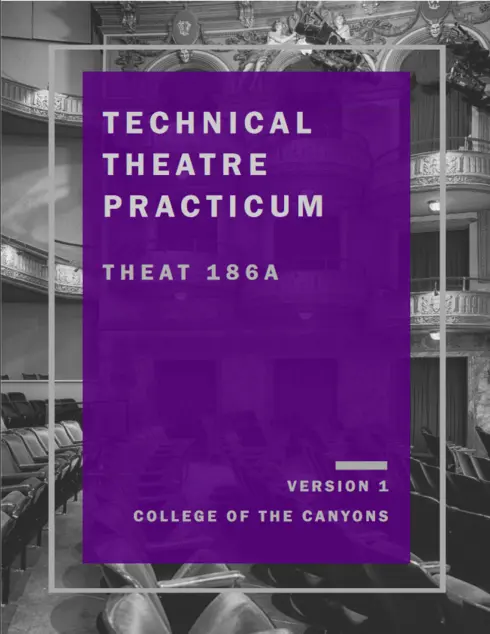
Technical Theatre Practicum - Version 1
![]()
![]()
![]()
![]()
![]()
Christopher R Boltz, College of the Canyons
Copyright Year:
Publisher: College of the Canyons
Language: English
Formats Available
Conditions of Use
![]() Attribution
Attribution
CC BY
Reviews
Reviewed by Max Ponticelli, Professor of the Practice, Wheaton College on 6/23/25
The book is very comprehensive for the introductory student regarding the technical theatre field. I appreciated the inclusion of Stage Managers, which can often be forgotten. I would have appreciated some information on projections or automation,... read more
![]()
![]()
![]()
![]()
![]()
Reviewed by Max Ponticelli, Professor of the Practice, Wheaton College on 6/23/25
Comprehensiveness
The book is very comprehensive for the introductory student regarding the technical theatre field. I appreciated the inclusion of Stage Managers, which can often be forgotten. I would have appreciated some information on projections or automation, but understand those might be considered more 'advanced' fields. I do wish there was a Glossary of terms, but the book has tons of vocabulary examples.
Content Accuracy
The book contains relevant, accurate, and appropriate information. It is up to date and is accessible to the student who might not have a background in any type of theatrical experience or education.
Relevance/Longevity
The book is a wonderful introduction to the field of technical theatre. It accurately explains how 'most' theaters function and even includes the flexibility of imagining spaces outside of a traditional venue. Some materials could use a little polish, but they feel like there is a human behind the examples, perhaps pulled from the author's own experiences, which gives it a personal touch.
Clarity
The writing style is very accessible. The text does not feel highly technical and often contains passages that feel conversational.
Consistency
The book is very consistent. In a field where each chapter could be its own unique textbook, the author does a wonderful job keeping the scope manageable. Each chapter feels very similar in frame of reference and size to its companions.
Modularity
Each chapter is a good example of selected reading topics and blends well with the others. I would likely use more specific or detailed readings as excerpts in a college-level course, but for an intro to theatre or directing and acting course, the book could be used very well in a modular manner.
Organization/Structure/Flow
The book flows very well and is organized effectively, with reason and intention.
Interface
The book is highly functional, with only 1 broken link in the Venues section.
Grammatical Errors
I can find no major grammatical, typographical, or formatting issues.
Some very minor typos, such as, "8 Rules Every Theatre Professional Mus Follow”
Cultural Relevance
The book is neutral in its presentation of a field that can be highly sensitive regarding cultural and societal issues. It does an excellent job of introducing a student to the industry, without placing an undue burden on cultural studies, global education, or diversity fields. The book mainly utilizes Western examples in the Additional Reading sections. I would have appreciated some introduction to global theatre, but it's not entirely necessary for an introductory technical theatre book. Perhaps an additional chapter or materials in the Additional Reading sections could be added in the future!
Table of Contents
- Chapter 1: Jobs in Technical Theatre
- Chapter 2: Working in a New Venue
- Chapter 3: Performance Etiquette
- Chapter 4: The Actor Scene Breakdown
- Chapter 5: Scenery
- Chapter 6: Stage Properties
- Chapter 7: Stage Lighting
- Chapter 8: Costumes
- Chapter 9: Sound
- Chapter 10: Blocking Notation
- Chapter 11: Production
- Chapter 12: Cueing Scripts
About the Book
Welcome to the exciting world of technical theatre. Studying this topic can lead to many different careers in several different sectors of the economy. The general skills needed for any of the careers or sectors have many things in common. Workers need to be dead-line oriented, as most productions have firm timelines that cannot be altered. Critical thinking and analysis are much needed skills. Almost every project in the field is unique and technicians and designers alike must discover the best way of reaching a project’s goal. Creative problem solving is trait successful practitioners have in common. With every project being unique, there are no guaranteed solutions to the problems that are presented. Technicians draw on their vast experience of what worked in the past that can be adapted to be a solution to the current problems. Clear communication and collaboration round out the necessary skills. No technical theatre project is ever handled by one person on their own. Collaboration with many people is the norm, and successful collaboration requires clear written and verbal communication skills.
About the Contributors
Author
Christopher R Boltz
